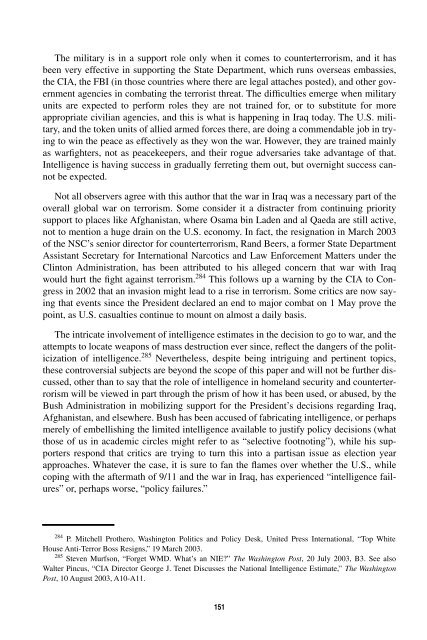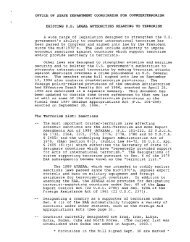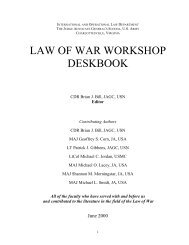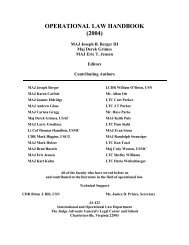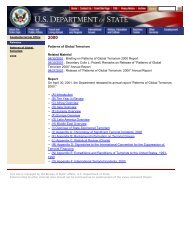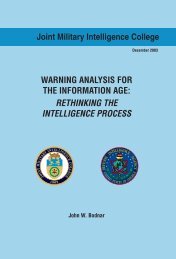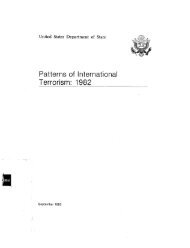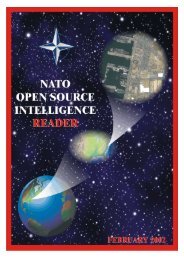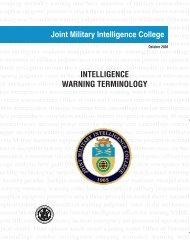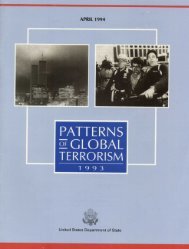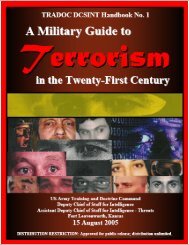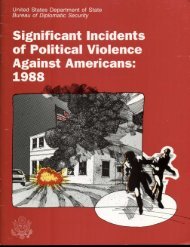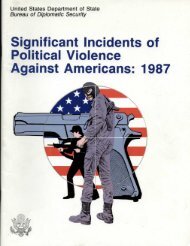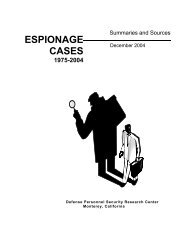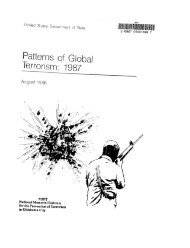learning with professionals - Higgins Counterterrorism Research ...
learning with professionals - Higgins Counterterrorism Research ...
learning with professionals - Higgins Counterterrorism Research ...
You also want an ePaper? Increase the reach of your titles
YUMPU automatically turns print PDFs into web optimized ePapers that Google loves.
The military is in a support role only when it comes to counterterrorism, and it has<br />
been very effective in supporting the State Department, which runs overseas embassies,<br />
the CIA, the FBI (in those countries where there are legal attaches posted), and other government<br />
agencies in combating the terrorist threat. The difficulties emerge when military<br />
units are expected to perform roles they are not trained for, or to substitute for more<br />
appropriate civilian agencies, and this is what is happening in Iraq today. The U.S. military,<br />
and the token units of allied armed forces there, are doing a commendable job in trying<br />
to win the peace as effectively as they won the war. However, they are trained mainly<br />
as warfighters, not as peacekeepers, and their rogue adversaries take advantage of that.<br />
Intelligence is having success in gradually ferreting them out, but overnight success cannot<br />
be expected.<br />
Not all observers agree <strong>with</strong> this author that the war in Iraq was a necessary part of the<br />
overall global war on terrorism. Some consider it a distracter from continuing priority<br />
support to places like Afghanistan, where Osama bin Laden and al Qaeda are still active,<br />
not to mention a huge drain on the U.S. economy. In fact, the resignation in March 2003<br />
of the NSC’s senior director for counterterrorism, Rand Beers, a former State Department<br />
Assistant Secretary for International Narcotics and Law Enforcement Matters under the<br />
Clinton Administration, has been attributed to his alleged concern that war <strong>with</strong> Iraq<br />
would hurt the fight against terrorism. 284 This follows up a warning by the CIA to Congress<br />
in 2002 that an invasion might lead to a rise in terrorism. Some critics are now saying<br />
that events since the President declared an end to major combat on 1 May prove the<br />
point, as U.S. casualties continue to mount on almost a daily basis.<br />
The intricate involvement of intelligence estimates in the decision to go to war, and the<br />
attempts to locate weapons of mass destruction ever since, reflect the dangers of the politicization<br />
of intelligence. 285 Nevertheless, despite being intriguing and pertinent topics,<br />
these controversial subjects are beyond the scope of this paper and will not be further discussed,<br />
other than to say that the role of intelligence in homeland security and counterterrorism<br />
will be viewed in part through the prism of how it has been used, or abused, by the<br />
Bush Administration in mobilizing support for the President’s decisions regarding Iraq,<br />
Afghanistan, and elsewhere. Bush has been accused of fabricating intelligence, or perhaps<br />
merely of embellishing the limited intelligence available to justify policy decisions (what<br />
those of us in academic circles might refer to as “selective footnoting”), while his supporters<br />
respond that critics are trying to turn this into a partisan issue as election year<br />
approaches. Whatever the case, it is sure to fan the flames over whether the U.S., while<br />
coping <strong>with</strong> the aftermath of 9/11 and the war in Iraq, has experienced “intelligence failures”<br />
or, perhaps worse, “policy failures.”<br />
284 P. Mitchell Prothero, Washington Politics and Policy Desk, United Press International, “Top White<br />
House Anti-Terror Boss Resigns,” 19 March 2003.<br />
285 Steven Murfson, “Forget WMD. What’s an NIE?” The Washington Post, 20 July 2003, B3. See also<br />
Walter Pincus, “CIA Director George J. Tenet Discusses the National Intelligence Estimate,” The Washington<br />
Post, 10 August 2003, A10-A11.<br />
151


